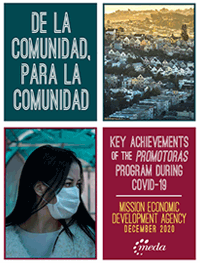Our Role & Approach
The ÇïϼÂ×Àí Evaluation Department’s role is to:
- Thought partner with staff, stakeholders and community members to advance a comprehensive data and learning strategy;
- Amplify the voices of community members;
- Make data accessible for our colleagues and partners for the purposes of promoting community well-being, social justice and systems change; and
- Support capacity-building and innovation related to data systems, analysis and storytelling.
Our four-person team sets the vision for ÇïϼÂ×Àí’s evaluation, data and learning priorities; conducts program and policy evaluation and needs assessment studies; designs and maintains data systems; and generates, gathers and analyzes quantitative and qualitative data. Our objective is to empower ÇïϼÂ×Àí staff and stakeholders to seamlessly access and utilize data to demonstrate need and impact; challenge ourselves to continuously improve programs; pursue innovation; adapt to changing circumstances; and mobilize stakeholders.
Our efforts are characterized by the following approach:
- Community centered: Community voices are at the center of our evaluation process and reflected in all activities, data systems and products.
- Equitable: Evaluation activities are conducted in a manner that is equitable and inclusive in terms of processes, who is included (e.g., staff, stakeholders, partners and community members), and capacity-building opportunities.
- Humble: We push ÇïϼÂ×Àí to remain introspective, iterative and focused on learning to challenge the status quo, promote continuous improvement of our own practices and adapt to benefit the needs of our community stakeholders.
- Curious: We model critical thinking, stay in touch with developments in the larger environment, and integrate best practices to address emerging challenges and try out new approaches.
- Proactive: We offer technical assistance, training and thought partnership to staff and community stakeholders that positions ÇïϼÂ×Àí as a leader in the field.
Data of Interest to Stakeholders

Key Achievements of the Promotoras Program During COVID-19
Read of the successes of this innovative community outreach model.
Read of the stressors of families making less than $35,000.
This 2017 report examines overcrowding and housing instability for ÇïϼÂ×Àí clients, particularly those with children.
Center for Financial Services Innovation report on the impact of Secured Credit Cards, which ÇïϼÂ×Àí uses to help clients build their credit score.
MPN, an initiative of ÇïϼÂ×Àí, conducted the second comprehensive Mission District community survey, comparing what occurred over two years.
MPN, an initiative of ÇïϼÂ×Àí, conducted the first-ever comprehensive Mission District community survey, to ascertain the needs of our clients.
“Taxes Plus: Go Further with ÇïϼÂ×Àí!” is putting clients on the road to family economic success.
NeighborWorks America, Citi and Success Measures worked on this reporting about how to scale financial coaching.
The National Association for Latino Community Builders (NALCAB) generated a report showcasing the urgent need for affordable housing in the Mission District of San Francisco.
This PolicyLink guide, with a ÇïϼÂ×Àí case study on pages 30-34, aims to describe the programs, policies and practices that set families on a path to financial security while achieving prescribed Promise Neighborhoods results.
The Citi Foundation (Citi), ÇïϼÂ×Àí and United Way of the Bay Area (UWBA) teamed up to answer one question: What makes tax clients take up other financial and asset building services?
“Mission Promise Neighborhood and SFUSD Student Enrollment Patterns 2011-2012”
Partner John Gardner Center of Stanford University completed this study for the Mission Promise Neighborhood (MPN).

